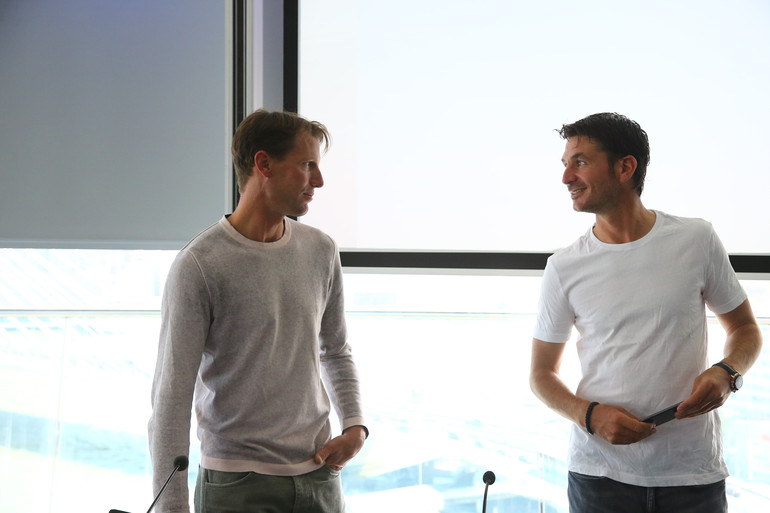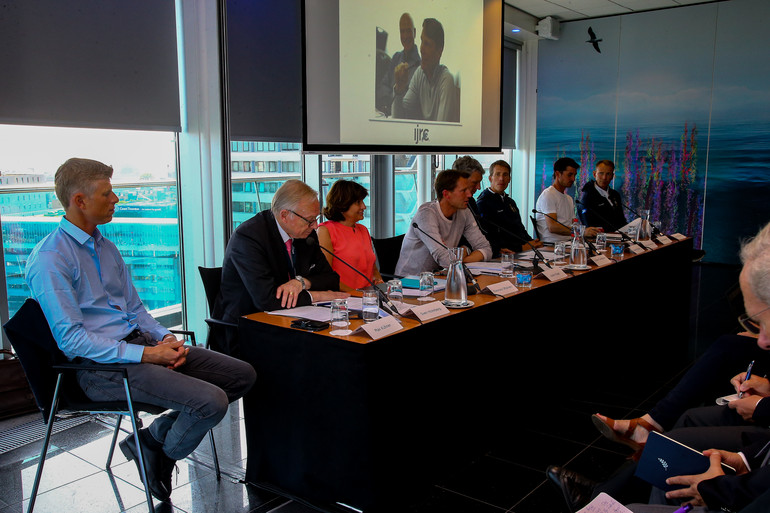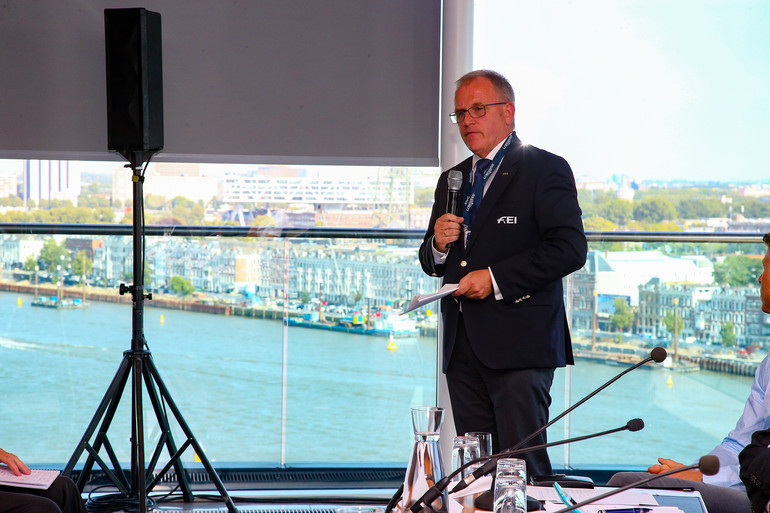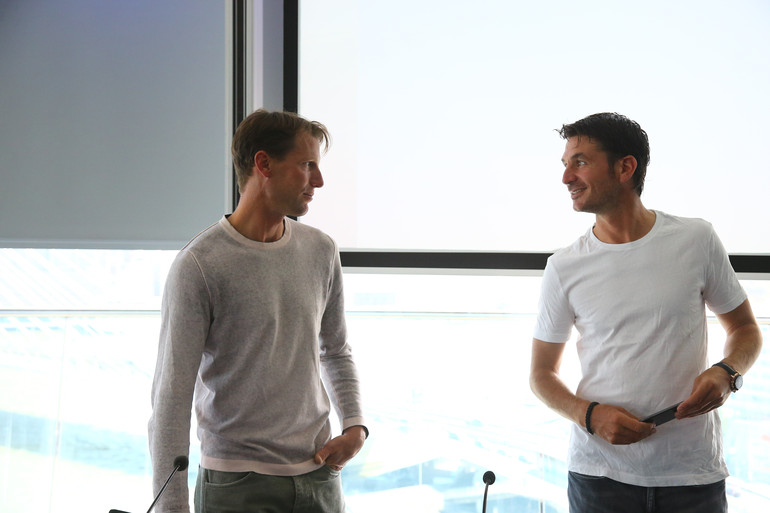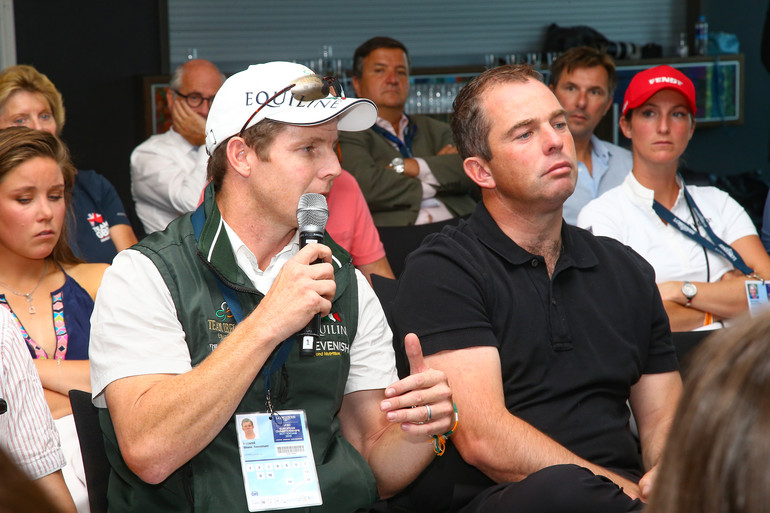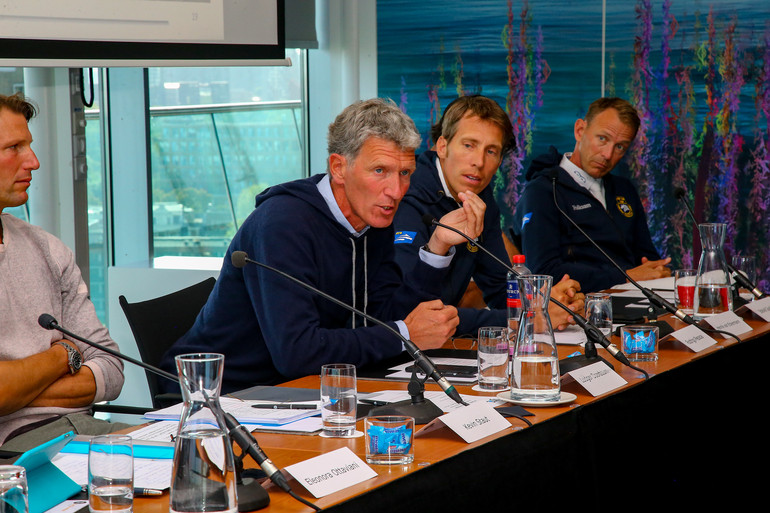Text © World of Showjumping
It was a sense of increasing frustration among the riders who spoke at the International Jumping Riders Club (IJRC) General Assembly in Rotterdam last Friday. Benched at the front of the meeting was IJRC President Kevin Staut, IJRC Director Eleonora Ottaviani, board members Max Kühner, Ludger Beerbaum, Henrik von Eckermann, Steve Guerdat and Peder Fredricson while the FEI was present with FEI President Ingmar De Vos, FEI Jumping Director John Roche and Stephan Ellenbruch who is Chair of the FEI Jumping Committee. In addition, FEI Deputy Legal Director Áine Power, FEI Veterinary Director Göran Åkerström and FEI Communications Director Grania Willis were all attending the General Assembly.
Many important topics were discussed, among those the new Olympic format that was tested in Hagen, Germany back in June, the situation of the Nations Cup series as well as contamination and stable security.
That the FEI and the riders have very different views became apparent early on in the discussion, especially when it comes to the new Olympic format. The riders seem to be united against having only three riders on the team rather than four, as well as competing individually first and then with the teams – and strongly voiced their concerns in this regard to the FEI representatives present.
The FEI Nations Cup series: “There are certainly structural things that we can improve”
"It sometimes sounds like a mantra, but also from our side – the FEI – we can clearly state that the Nations Cup for us is our most important competition, our most important series together with the World Cup,” FEI President Ingmar De Vos said as the discussions got underway, once again highlighting the importance of the Nations Cup series. “We are really very supportive of it, I mean it would be ridiculous not to support your own products – so we are fully behind that. But we are living in a very complicated world, and that’s also thanks to the growth of the sport, so we need to see what we can do and what we cannot do."
As to how the FEI is planning to improve one of their flagship products, De Vos stated: “Now we are looking at how we can implement all the different proposals coming, not only from the IJRC but also the NFs, and also from other stakeholders because we agree with you that the product can be further improved and strengthened in order to achieve our common goal. I don't have a very detailed plan now because this is all in the decision-making process, which started with the Round Table. We have a Jumping Committee meeting in Barcelona to look at all the aspects and the future seasons of the Nations Cups, because there are different aspects.”
“There are certainly structural things that we can improve. We really look forward to do that together, so I would say we will come back to you after Barcelona on the proposals for the future,” De Vos said.
In return, Shane Sweetnam – a regular on the Irish team – voiced his observations: "I have been doing Nations Cups for a long time now, 12-13 years. Ingmar just said that they are trying to make the product better, but my feeling of the Super League – and I did three this year – is that in the last 2-3 years the standard has dropped. They’ve added the money, but it’s not about the money – it’s about representing your country and tradition. For my feeling it seems to be getting dumbed down a little bit.”
“I feel we are getting a little bit lost at the moment with the Nations Cup series and it definitely has to be discussed more with the riders that do go all the time. I know you are spreading your base, you want more countries in it but when the little countries come in to those leagues, they do struggle every time," Sweetnam continued. “It’s at a difficult period in my opinion.”
The new Olympic format: “FEI is going to be the only one responsible for the mess we are going to see in Tokyo”
The debate then moved on to the new Olympic format, that was tested in Hagen, Germany back in June.
“You were all involved in the creation of the new concept and rules, and right from the beginning we have to agree that we disagree a little bit on some things," Stephan Ellenbruch said. "There might be things you like, there might be things you don’t like. I’m happy riders were always involved in these procedures, Max (Kühner) was involved in the beginning, Rodrigo (Pessoa), then Cian now. We are very happy to get your input, however sometimes we have to find compromises.”
“For the process, there is a new set of rules – it has been approved, it has gone through all the FEI hierarchies and General Assembly, so this is what we have at the moment. There is also a timeline which has to be respected – the IOC sets timelines – and from a certain point you cannot change rules anymore,” Ellenbruch said. “The timeline to change the rules for the 2020 Olympics is gone already, so there is no way to make major changes to the existing rules. It is what it is. We might be happy with the format, we might not be happy, but there is no way to change things.”
“We should not have new discussions about four riders or three riders, that’s done,” Ellenbruch stated. “And the other thing that we simply can’t discuss is, and I could give you a lot of arguments why it is like it is, that we do the individuals first and then the teams after (…). We can't change it, that’s done. It’s going to be like this for the 2020 Olympic Games.”
Ellenbruch also gave an insight into the test event in Hagen, Germany. "In my opinion it was a successful event. Successful, because the idea to hold this event was to identify things that could be improved. If you put together a new set of rules, on paper it might seem good but in reality there might be problems,” he said.
“Our aim was to make it understandable, not only for us but also for people who are not in the sport,” Ellenbruch said. “The second thing is that we have to see that it is absolutely fair. The third thing is of course it should be horse friendly. We have identified some issues here. Starting with making things understandable. With three riders, we will not have a drop score anymore. However, there must be a chance for a team to survive and get a ranking even if one of the team members would be eliminated. The idea was to introduce a kind of an artificial score, with the idea of giving the rider the worst result of the whole class and adding four penalties to have a score for the eliminated rider. What became obvious in Hagen was that you simply can’t explain that, because the team result is constantly changing. We couldn’t display that, it was not possible to show that and nobody would understand that,” Ellenbruch said of the no-drop-score situation. “So, we identified something here that we definitely have to change.”
“Something about fairness,” Ellenbruch continued. “We made some simulations about the idea to give the worst result plus four, and we found that as simple as that it does not work. There is a likelihood that you can make, let’s call it some sort of manipulation, that you are better off if you do not send your third rider in the ring. With this he (the rider) would get the worst result plus four, and with this you would win a medal or qualify for the second round – not by competing but just by strategy and not performing. I don’t think that anybody in this room is in favour of something like that.”
To find a solution, Ellenbruch explained that the Jumping Committee has agreed on some proposals. “We don't want to have the artificial results, a worst result plus X,” he said referring to the risk of it not working and being un-understandable to viewers. “The idea is to go for a pretty simple concept, the idea is to have three results counting. So, a team which has three results must always be better than a team with only two results. So, you would do a ranking with the teams with three results, and if you have a team with only two results then these would be ranked after the teams with three results. That is very easy to display on scoreboards, that is very easy to sell, everybody will understand that. The situation with the jump-off, we want to keep it simple and we want to do a "normal" jump-off with three riders competing per team and three results counting adding them together. With this you win a medal, or you don’t win a medal. That is a clear way to do it, and very understandable – and it should be possible to do this.”
“These are the proposals at the moment from the Committee, they will go to the FEI Board and after that to the IOC. Once again, the headline is that we can do minor modifications,” Ellenbruch said. “We simply can't to general changes to the rules."
After Ellenbruch's explanations about the new Olympic format, that a year ahead of the Games still is in the process of being modified, Steve Guerdat commented: "I believe we all know that there is no hope for any big changes for the Olympics. But, especially if we have some journalists here today I want them to know that the FEI is going to be the only one responsible for the mess we are going to see in Tokyo. Because you did listen, but you didn't really listen to what we were saying. There was no compromise, never. You had one line from the beginning, and we had one line from the beginning and that was four riders and teams first. So, there was no compromise. I think you have to take your responsibility. Nowhere do I want to read that this was a compromise between the FEI and us riders!"
"As Stephan said, there are no ideal solutions in this world,” was Ingmar De Vos response to Guerdat. “We had a very clear message from the IOC, you know the Olympic Agenda 2020 – it was very clear: Change or be changed. This is what we did. We took our responsibility together with our National Federations to do the necessary change in order to allow a more transparent competition system but moreover a universal system, with more nations,” he said adding that the new format has to work because failure is not an option.
“Being a part of the Olympic movement is really important for our sport,” De Vos said also asking the riders for their support. “We need to stand united together as one community behind this, and support this. We will see after the Olympic Games of Tokyo what eventually has to be changed.”
“There is no point in consulting, if you ignore”
After both Ellenbruch and De Vos had spoken, Cian O'Connor – athlete representative in the FEI Jumping Committee – spoke: "It is quite hard to sit here in silence,” he said. “It is hard to listen to the untruths that you both have spoken about for some time. To say ‘change or be changed’, if that was the philosophy from the IOC, but they never put down the parameters – those are things we came up with, things that you came up with together with John Madden. It is completely disingenuous of you to say that the riders and stakeholders, like Stephan said, have been consulted. There is no point in consulting, if you ignore. That is not consulting, that is just dictatorship. That’s what’s going on,” O’Connor said.
“The Nations Cup, you said, was something you support. Yet the contract with Longines is not open to the Jumping Committee because it’s confidential,” O’Connor continued. “The FEI is in disarray and you have to wake up and see it. 20-30 years ago, it (FEI) was full of people who knew something about the sport, and now it is administrators. If you don’t realize that it is a total, sinking ship, you are deluded."
“You think that it is going to bring the level up with more flags, it’s going to dumb the level down – it is the opposite actually,” O’Connor thundered to the FEI representatives about the jumping sport’s future at the Olympics – making note of the high penalty scores in many of the Olympic qualifiers. “The modernisation needs to take place with the countries being up to the level. You can’t say we’re modernising to take in more countries yet some of the qualifications are a joke,” O’Connor said in response to De Vos.
“We are doing our utmost taking into account all the parameters,” De Vos replied. “And I tell you, you do not always have all the parameters. And we can agree to disagree, but we need to make this a success. We need to move on with our sport, and we need to make the best Olympic Games ever.”
Ellenbruch then added that the athletes qualifying their country not necessarily get to compete at the Games, they also need to earn their Certificate of Eligibility. “That a country qualifies at one of these qualifiers does not mean that these athletes will compete. These athletes have to show at a normal show, and they have to get their Certificate of Capability to compete at the Olympic Games. Just that a country qualifies, does not mean that these people who made it with 48 penalties or whatsoever will compete at the Olympic Games,” he said, to which O’Connor replied: “That just means that they have to survive somewhere.”
Rodrigo Pessoa then took the word and said: “Those are the best ones that they send. If they go to a qualifier, why would they send their worst ones? They send what they have best!”
"We really do worry”
Max Kühner took note of the difficulty of accepting the major changes that have been made. "I think we all agree that these changes are really big, and they have a big influence on us (riders). These changes are based on the message from the IOC that there has to be a change. But we have only heard these things from you (FEI), we have never actually seen that message. If you could give us this message from them (IOC) to see, all these big changes would maybe be easier to accept," he suggested and was again referred to the Olympic Agenda 2020 by the FEI.
Kevin Staut, IJRC President, commented on the heated discussion: "I have to say that when Steve and Cian speak, it shows that the riders are really affected,” he said. “The drop score is really important. We know that IOC asked to change, but they did not ask for the drop score to be gone. You decided and it’s really hard to accept. We were speaking a lot about it, and every single rider was against this big change. So, you have to understand that for us it is really difficult to accept,” Staut continued.
“Most of us think it will be a disaster. You have the proof from the test event. Even the small changes you will do, will not change the fact that there is no drop score,” Staut continued. “It is not aggressiveness, it is just to show that we are really affected by this change.”
Voicing the riders' opinion, Ludger Beerbaum then filled in: "We really do worry. It’s just not to be against, and to say you do everything wrong – I’m sure you don’t. You (FEI) have a different view to some of the things, more political matters. Even when you talk on the level of Thomas Bach, and the new reform for the future Olympic Games,” the German legend said. “What we would like to express is that we are worried, and not just to be against. We are really worried. We have this welfare issue, the only sport in the entire world that has this subject: Horse welfare. No tennis, car, no football – we have this. And this is what worries us, this is the only thing we would like to express. Maybe at one point where you (FEI) were confronted (by the IOC), which was tough, at that point there should maybe have been done more work to explain that we have a problem. Explain this to the technical bodies in the IOC to say we have limits when it comes to being more open and more flexible.”
“We are all sitting in the same boat, and we should try to make the best of it – I agree there,” Beerbaum continued. “But I think we have a situation that is not comfortable for us. Did the IOC ever tell us that we have to have the individual final before the team final? I don’t think they go into this technical matter. And this is also something that worries us, because the course builder is going to have a hell of a job with all the weak ones. Either it will be far too easy or far too heavy, and we will not really see welfare of the horse!"
“Ingmar, you said the FEI and the National Federations decided, but I must say then that in the (FEI) General Assembly, there are sitting about 140 nations but 100 are not knowing anything about the reality of our sport – the people who are sitting there voting,” Breido Graf zu Rantzau, President of the German Equestrian Federation, said. “Only 20-30 people are doing the right thing, and I think this has to be said. That cannot be the future way of the FEI, with non-riding countries making politics for the right sport.”
As a final message, Ingmar De Vos encouraged the riders to be positive. “Again, this is a new format, this is not fine-tuning of the old format,” he said. “It will change drastically how Chef d’Equipes will have to organise their teams. But I ask you one thing: Try to look positive about it. After the Olympic Games we will of course have to make an assessment of what worked and what did not work. Even if there is a certain moment where we would come to the conclusion that it did not work, we will have to go back to old systems – we are not stubborn on these points,” he continued. “Try it, try it together with us, we will evaluate it together. If things need to change for the next edition of the Olympic Games we will do that. In the interest of the sport, in the interest of the welfare of the horses and the athletes.”
Watch the IJRC General Assembly
No reproduction without permission, copyright © World of Showjumping



